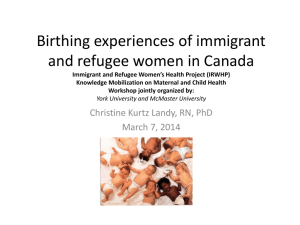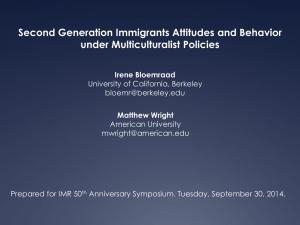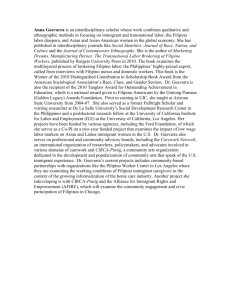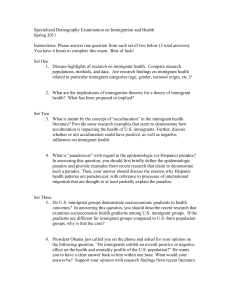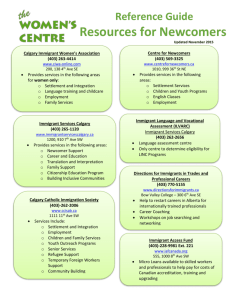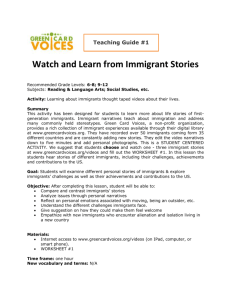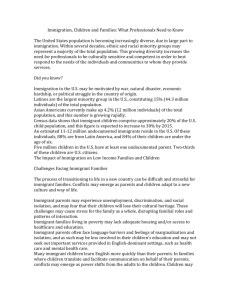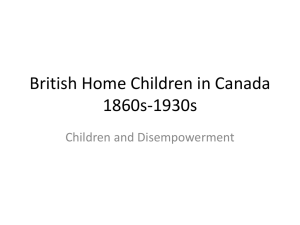Abstracts of Research Funded in 2006-2007
advertisement
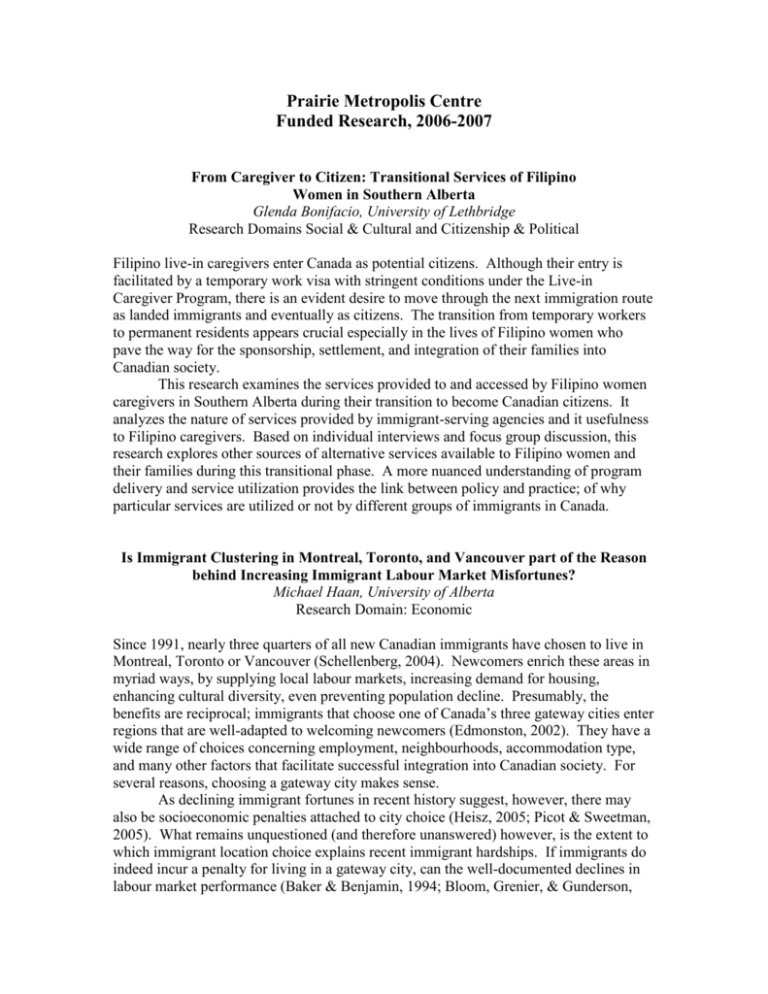
Prairie Metropolis Centre Funded Research, 2006-2007 From Caregiver to Citizen: Transitional Services of Filipino Women in Southern Alberta Glenda Bonifacio, University of Lethbridge Research Domains Social & Cultural and Citizenship & Political Filipino live-in caregivers enter Canada as potential citizens. Although their entry is facilitated by a temporary work visa with stringent conditions under the Live-in Caregiver Program, there is an evident desire to move through the next immigration route as landed immigrants and eventually as citizens. The transition from temporary workers to permanent residents appears crucial especially in the lives of Filipino women who pave the way for the sponsorship, settlement, and integration of their families into Canadian society. This research examines the services provided to and accessed by Filipino women caregivers in Southern Alberta during their transition to become Canadian citizens. It analyzes the nature of services provided by immigrant-serving agencies and it usefulness to Filipino caregivers. Based on individual interviews and focus group discussion, this research explores other sources of alternative services available to Filipino women and their families during this transitional phase. A more nuanced understanding of program delivery and service utilization provides the link between policy and practice; of why particular services are utilized or not by different groups of immigrants in Canada. Is Immigrant Clustering in Montreal, Toronto, and Vancouver part of the Reason behind Increasing Immigrant Labour Market Misfortunes? Michael Haan, University of Alberta Research Domain: Economic Since 1991, nearly three quarters of all new Canadian immigrants have chosen to live in Montreal, Toronto or Vancouver (Schellenberg, 2004). Newcomers enrich these areas in myriad ways, by supplying local labour markets, increasing demand for housing, enhancing cultural diversity, even preventing population decline. Presumably, the benefits are reciprocal; immigrants that choose one of Canada’s three gateway cities enter regions that are well-adapted to welcoming newcomers (Edmonston, 2002). They have a wide range of choices concerning employment, neighbourhoods, accommodation type, and many other factors that facilitate successful integration into Canadian society. For several reasons, choosing a gateway city makes sense. As declining immigrant fortunes in recent history suggest, however, there may also be socioeconomic penalties attached to city choice (Heisz, 2005; Picot & Sweetman, 2005). What remains unquestioned (and therefore unanswered) however, is the extent to which immigrant location choice explains recent immigrant hardships. If immigrants do indeed incur a penalty for living in a gateway city, can the well-documented declines in labour market performance (Baker & Benjamin, 1994; Bloom, Grenier, & Gunderson, 1995; Boyd & Thomas, 2001; Frenette & Morissette, 2003) be explained as a three-city phenomenon instead of a national trend? This project seeks to determine the effect of gateway clustering on immigrants by using sample selection regression techniques for continuous variables (Heckman, 1979) and the 2001 Census of Canada confidential master files (located in Ottawa at the Statistics Canada headquarters). More succinctly, it will determine whether immigrants who choose Canada’s three largest census metropolitan areas (CMAs) fare better or worse concerning three labour market outcomes (employment status, suitability, and earnings). Educational Needs and Barriers for African Refugee Students in Manitoba Yatta Kanu, University of Manitoba Research Domain: Education Manitoba has seen an unprecedented increase in the number of refugee students of African origin in the past five years, without effective educational and other forms of support specifically targeted at assisting the acculturation, integration and school success of this group of students who are all from war-affected, disrupted schooling backgrounds and whose culture, ethnicity, language and religion are significantly different from those of the mainstream in the host country. This lack of targeted support has resulted in dramatic school dropout rates and increased criminal gang activities and prostitution among this population. There is need for research that guides and informs targeted and effective support programming for this group of newcomers. To this end, the proposed study will investigate three questions: (1) What do African refugee students need to succeed in Manitoba schools? (2) What are the barriers to their school success? (3) What kinds of interventions are needed to overcome these barriers? Its objectives over a 12 month period are to: use multiple data collection methods to gather data pertaining to the research questions among African refugee students in 2 Manitoba high schools, the principal and some teachers of these schools, and parents, community leaders, and high school dropouts from selected African refugee communities; analyze the data to generate recommendations for providing targeted academic and social supports and services to African students of refugee origins; and disseminate the results of this study to relevant community stakeholders, policy makers, schools and school boards, and Prairie faculties of education. Examining Social Justice Education in Action Darren Lund, University of Calgary Research Domain: Education The proposed study will build on the Researcher’s current Metropolis-funded research, “Fostering Acceptance and Integration of Immigrant Students: Examining Effective School-based Approaches in Prairie Schools,” by studying a specific social justice program in a Canadian school setting. Currently in its final stages, the ongoing study examined school-based initiatives across three provinces, looking at projects designed to enhance the social acceptance of immigrant and refugee students. Robust data from indepth interviews with 13 student and teacher activists will now inform the next phase of this research, focused on a critical examination of an innovative “Social Justice Education Program” at an urban high school in the prairie region. The researcher seeks to better understand the daily experiences, challenges, and successes of a group of students and teachers who have undertaken to address issues of racism and discrimination in their school. The proposed study will add depth to our understanding of the vital roles that teachers and students can play as agents of integration and will contribute to other studies in the education domain at this and other Metropolis centres. The results of this study will be of interest to social justice activists, researchers, teacher educators, curriculum policy developers, school administrators, and community agencies. I will link this research to other regional studies of formal school and district courses, projects, and policies in cultural programming and to other official responses to immigrant students, contributing to policy and programming associated with growing school diversity. Immigration Flow Patterns: Western Canada Regional Analysis Valerie Pruegger, University of Calgary Research Domain: Economic This research investigates the dynamics of immigrant retention for the major cities in Western Canada: Winnipeg, Saskatoon, Regina, Edmonton, Calgary and Vancouver. Using a model for estimating immigrant retention rates, variations in immigrant retention by immigrants from different source regions will be analyzed for the 1986-2001 period. Resulting variations will be analyzed to identify potential relationships between socioeconomic characteristics and calculated retention rates for source regions. This analysis will help municipal partners, identify push/pull factors unique to their local contexts and to develop appropriate policy and strategy recommendations around immigration at the municipal level. The Labour Market Experiences of Immigrant, 1.5 Generation and Secondgeneration Immigrant Youth in Canada Lori Wilkinson, University of Manitoba Research Domain: Economic This three-site project is intended to examine the initial labour market experiences of immigrant, 1.5 generation, and 2nd generation immigrant youth in Winnipeg, Vancouver and Toronto. A central feature of the transition to adulthood for many youth is the acquisition of employment. We know very little about the transition to work amongst newcomer and second-generation young people. Since immigrant youth make up a significant number of entrants to the labour market, it is important to understand that process and to learn more about the successes and the barriers to obtaining and retaining gainful employment. Using a series of focus group interviews, the team will explore whether or not social capital influences the employment prospects of Filipino/a, Chinese and Asian youth. Since both community services providers and provincial government stakeholders are involved in project development, data collection, and analysis, it is hoped that our study will ensure the results of our research are utilized in current policy and practice. An Analysis of the “Post-Multiculturalism” Discourses Lloyd Wong, Joe Garcea, Anna Kirova University of Calgary, University of Saskatchewan, University of Alberta Research Domains: Education, Social & Cultural, and Citizenship & Political The “post-multiculturalism” discourse which emerged on the heels of the antiimmigration and anti-multiculturalism discourses in the 1990s, has become increasingly popular in recent years, especially after 9/11 and the recent Madrid train bombings in 2004 and the London bombings in 2005. it is based on the perception that multiculturalism is not working, or has not worked, in the sense that it is claimed to be segregating (rather than integrating) diverse ‘racial’, ethnic, and religious groups. From this point of view, the practice of multiculturalism contributed to a fragmentation of society and makes social cohesion difficult if not impossible. In the proposed study, a pan-Canadian team of researchers will deconstruct ‘post-multiculturalism’ discourses in both the French and English languages in two specific substantive areas: 1) media sources and 2) academic sources. The analytical tools and concepts that will be utilized within this methodological approach will include truth claims, power/knowledge, discursive practices, etc. The analyses of these discourses will inform a discussion about their potential implications for Canada and the current Canadian public policy on multiculturalism. A number of critical papers based on the review and synthesis of disparate bodies of literature on multiculturalism, immigration, integration, citizenship and education will address the following research questions, What are the implications of the ‘post-multiculturalism’ discourse on Canadian public policies?, and What initiatives or strategies are needed to influence the ‘problematic’ dimensions of ‘postmulticulturalism’ discourse? Multiple presentations to various audiences and an edited volume are planned to communicate the results of the study.
